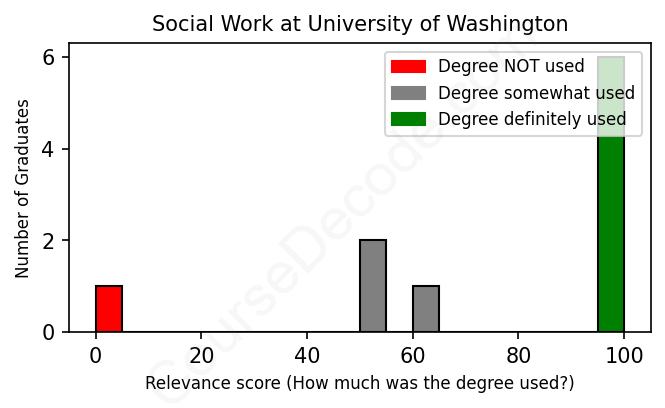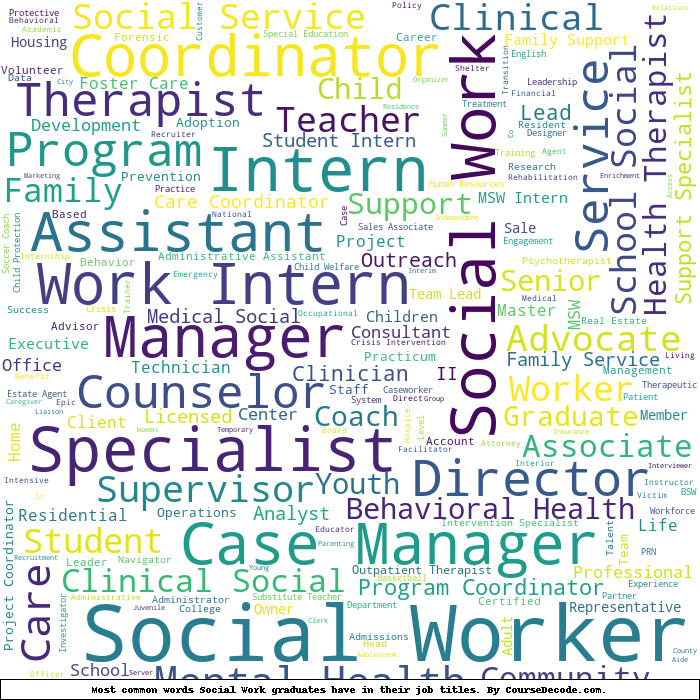
First, some facts. Of the Social Work graduates from University of Washington we've analyzed , here's how many have used (or NOT used) their degree in their career:

These are estimates based on AI analysis of 10 LinkedIn profiles (see below).
The verdict? Above average. Overall, with an average relevance score of 76%, Social Work graduates from University of Washington have a higher likelihood (+9%) of finding work in this field compared to the average graduate across all fields:
And for comparison, here's the chart for all profiles we've looked at across all degrees.
Also, after graduating, 40% of these graduates have pursued further education other than another Bachelor's degree (such as a Masters degree or other), compared to the average across all profiles of 35%. This suggests you may need more than just a Bachelors degree to be competitive as a Social Work graduate.
See the details:
|
Relevance score: 50% We think this person has gone into a career only somewhat relevant to their degree. We think this person has gone into a career only somewhat relevant to their degree.
DEGREE INFOGraduated in 2019 from University of Washington with a Bachelor's degree in Social Work. No other secondary education since. JOB HISTORY SINCE GRADUATIONOperational and Admin Assistant COMMUNITY LUNCH ON CAPITOL HILL Feb 2021 - Aug 2021 ABOUTNo information provided. |
The top 10 most common jobs done by the graduates we've analyzed (ranked most common to least) are:
From analyzing the jobs held by graduates of the University of Washington with a degree in Social Work, it’s clear that many individuals are carving out careers that are closely tied to their field of study. Common roles include Case Managers, Program Assistants, and various counseling positions, all of which directly utilize the skills and knowledge gained during their social work education. These positions often involve supporting individuals and families, promoting mental health, and managing community resources, which are central themes in social work practice. For instance, jobs like Adult Day Health Case Manager or Mental Health Technician are perfect examples of graduates applying their social work principles in real-world settings.
However, not all jobs held by these graduates are directly relevant to social work. Some have ventured into fields that, while perhaps benefiting from soft skills learned in social work, do not fundamentally align with the profession. Positions like Assistant Manager at a flower-growing business or a barista at Starbucks might not leverage the technical knowledge of social work, which leaves a bit of a mixed bag when looking at the career paths. In summary, while many graduates enjoy fulfilling careers in social services, a notable number have strayed into roles that don’t directly apply their specialized training.
Here is a visual representation of the most common words in job titles for Social Work graduates (this is across all Social Work graduates we've analyzed, not just those who went to University of Washington):

When you look at the career trajectories of graduates from the University of Washington who studied Social Work, you can see a pretty consistent pattern, especially in the early stages right after graduation. A lot of them tend to land jobs that are closely related to social services, such as case managers, program assistants, and counselors. For example, many graduates from 2016 started with internships or entry-level positions in mental health and foster care. This indicates that they’re using their degree right away in meaningful ways, often working with vulnerable populations or in nonprofit settings. However, there are a few cases where graduates took detours, like someone becoming a Business Development Manager, which isn't directly related to social work.
Fast forward a bit, about five or ten years later, and it’s clear that many of these graduates stabilize into roles that hold more responsibility, like program directors, mental health clinicians, or assistant counselors. It's quite hopeful to see that a majority still remain within the social work realm, indicating that the degree is genuinely valuable and allows for progression in their careers. That said, there are some who drift away from core social work roles—like the graduate who became a barista—showing that while some stick to their paths, others do explore different avenues. Overall, most seem to be finding solid, relevant career opportunities and growing in their fields, which is pretty encouraging!”
Honestly, a Bachelor’s degree in Social Work can be pretty demanding, but it really depends on your interests and strengths. At the University of Washington, you’ll encounter a mixture of theoretical classes and hands-on field work, which can be a lot to juggle. The courses often dive deep into issues like human behavior, social justice, and community resources, requiring a good amount of critical thinking and writing skills. If you’re passionate about helping people and committed to the coursework, it can be really rewarding—but don’t underestimate the workload! It’s not the easiest degree out there, but with the right mindset and support, it’s definitely manageable.
Most commonly, in the LinkedIn profiles we've looked at, it takes people 2 years to finish a Bachelor degree in Social Work.
So, looking at the career paths of these University of Washington social work grads, it seems like they're mostly sticking to jobs that are pretty common in the field, like case managers and counselors, which often don't come with huge salaries. Many of them have worked in non-profits or healthcare settings, which can be rewarding but might not pay as well as you'd hope, especially at the start. A couple of them have more senior roles or seem to be moving up the ladder, which could mean they’re making decent money now, but overall, it seems like they might have to be frugal and passionate rather than rolling in dough. So, if you’re thinking about a degree in social work, just know it’s more about making a difference than cashing in big bucks!
Here is a visual representation of the most common words seen in the "about" section of LinkedIn profiles who have a Bachelor degree in Social Work (this is across all Social Work graduates we've analyzed, not just those who went to University of Washington). This may or may not be useful:

Here are all colleges offering a Bachelor degree in Social Work (ordered by the average relevance score of their Social Work graduates, best to worst) where we have analyzed at least 10 of their graduates: